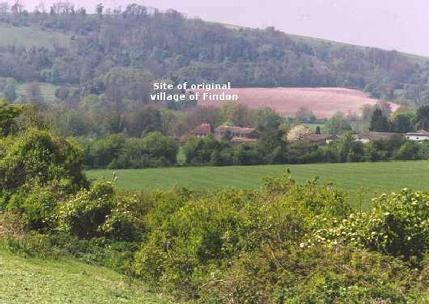
3 minute read
Findon History - Murder
By Valerie Martin
Above is my photo showing the site of the original village of Findon to the north of the church viewed from the Racing Gallops in May 1999. Muriel lived in the village of Findon over 7 centuries ago. 200 years on from the Battle of Hastings the influence of the Norman French had spread throughout the country, even encompassing insignificant rural communities such as Findon. A proportion of the populace was of Norman descent with obvious French names. The following is my attempt to re-enact a potted version of Findon history. There was a church in Findon in the 13th century and it’s assumed the village inhabitants clustered around it. From the church an intriguing glimpse of the dingy roofs of the dwellings, smothered in ivy and scrub, could probably be seen between the trees. Shards of medieval patterned pottery and glassware have been unearthed in the field opposite the church. The simple dwellings would have seemed homely to their occupants with primitive hearths, adorned with domestic ironwork, perhaps with iron cauldrons, pot-hangers and kitchen pottery hanging above three-legged skillets. Muriel had a son, Richard. He was a wellfavoured and energetic young man who she considered had great qualities and joie de vivre. They had a neighbour named Robert Shaldewyn who lodged in the household of Ralph Cucku. There is no known motive for the events of 1278 A.D. but it appears that Muriel’s son and Robert Shaldewyn waylaid each other. A quarrel ensued, ending in a heated argument. Both participants were outraged and punched out wildly. The reason for the fistfight is unknown; perhaps their grievance was with a business deal or, maybe an affaire du coeur — cherchez la femme. The law in medieval Findon required every able bodied man to keep a weapon in readiness to assist his sovereign and the realm in crisis and emergency. Maybe Robert Shaldewyn was older and could just handle himself better than Richard and had a stronger sense of preservation. The result of the encounter was that Muriel’s son was struck down with horrific butchery, and with the final coup de grâce he suffered such severe wounds in the fracas that he died. Robert Shaldewyn feared for his life and decided to flee. Not waiting to face the consequences he headed west - his destination was Chichester. He sought refuge in "the Great Church of Chichester". The Assize Roll records what occurred in that year in the "Hundred of Brightford". It is known that three of Muriel’s neighbours promptly came forward, (likely witnesses to the crime). They were not held under any suspicion. Another neighbour, named as Gilbert le Coveror, failed for an unknown reason to put in an appearance at the inquest. It was left to two men, William Frewyn and John le Clerk to arrest Robert. Robert Shaldewyn was eventually brought before the Coroner of the City of Chichester and charged with murder. It was revealed he did not own any belongings whatsoever and had been living under the roof of Ralph Cucku. The accusation of killing Richard was quite specific and damning. Robert confessed to slaying Richard and was sent "into exile for his crime". This was the normal punishment for a guilty person who had chosen to flee and take refuge in a church. His banishment meant he might well have sailed from the ancient seaport of Shoreham, which was at the time, the closest important town to Findon. In the absence of real proof that the murdered Richard was an Englishman, it was assumed he was of Norman descent. He was, therefore assumed to be of some consequence in the community of Findon, and by reason of that, a fine was levied on the unfortunate "Hundred". Findon’s so called "nearby townships" of Washington, Clapham, Offington and Broadwater did not attend in full number to the inquisition before the Coroner of Chichester so were also liable to a fine for their non-appearance.
Advertisement









